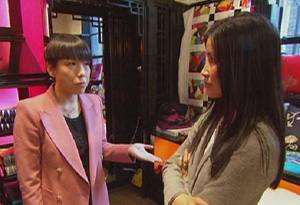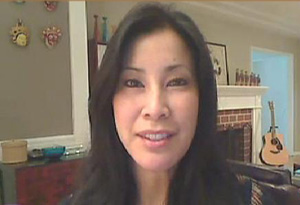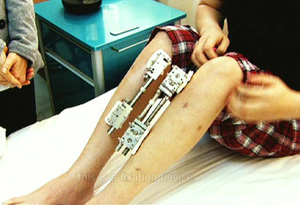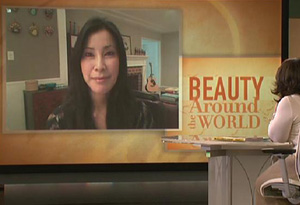China's Beauty Boom

For most of the Western world, style in the late '60s and early '70s was defined by miniskirts, mod dresses and platform heels. But for China, the most populated country on the planet, these were decades devoid of style.
In 1966, China's Communist Party chairman Mao Zedong launched his Cultural Revolution and banned the pursuit of beauty. For 10 years, every man, woman and child was required to dress in masculine, military-style uniforms. Any display of femininity—like long hair, makeup or jewelry—was strictly forbidden. If a woman broke the rules, she faced severe punishment.
Now, there's another revolution happening—a billion-dollar beauty boom. Lisa Ling travels 7,000 miles to Shanghai to see how China is redefining its standard of beauty.
Five years ago, Vogue magazine launched a Chinese edition. Angelica Cheung, the editor-in-chief, says it's been a success since the first issue hit stands. "We were the first Vogue to actually make a profit in the first year," she says.
Angelica says, in the past 10 years, women in this Communist country have started to enjoy all that the beauty industry has had to offer...and business is booming.
"Go into any store that sells cosmetics or skincare products throughout the country, and it will be packed," Lisa says. "In fact, next to tourism, automobiles and real estate, beauty is the fourth-biggest industry in the biggest country in the world."
In 1966, China's Communist Party chairman Mao Zedong launched his Cultural Revolution and banned the pursuit of beauty. For 10 years, every man, woman and child was required to dress in masculine, military-style uniforms. Any display of femininity—like long hair, makeup or jewelry—was strictly forbidden. If a woman broke the rules, she faced severe punishment.
Now, there's another revolution happening—a billion-dollar beauty boom. Lisa Ling travels 7,000 miles to Shanghai to see how China is redefining its standard of beauty.
Five years ago, Vogue magazine launched a Chinese edition. Angelica Cheung, the editor-in-chief, says it's been a success since the first issue hit stands. "We were the first Vogue to actually make a profit in the first year," she says.
Angelica says, in the past 10 years, women in this Communist country have started to enjoy all that the beauty industry has had to offer...and business is booming.
"Go into any store that sells cosmetics or skincare products throughout the country, and it will be packed," Lisa says. "In fact, next to tourism, automobiles and real estate, beauty is the fourth-biggest industry in the biggest country in the world."

Over the past decade, Lisa has traveled to China more than a dozen times, and in that time, she's seen this beauty boom affect women's lives dramatically. "In the early years, it was so obvious when you would see someone from the mainland because she just didn't really have any style," Lisa says. "It wasn't important."
Lisa says she used to draw crowds if she wore lipstick in China...but not anymore. "Now, when you go to China, it is so incredibly modern, and you'll see some of the most stylish women you would see anywhere," she says. "It's changed remarkably in a very short period of time."
The world will have to wait and see if this cultural shift is for better or for worse. "I think what's happening in China is symbolic of what has happened all over the world," Lisa says. "Is it a good thing when women are completely obsessed with enhancing their look and becoming more beautiful? It's a hard one to say because we all sort of are. ... But is it a little sad? It is, because it has changed so quickly. It's, I think, always unfortunate to see large groups of people becoming sort of slaves to the whole machine, if you will."
Lisa says she used to draw crowds if she wore lipstick in China...but not anymore. "Now, when you go to China, it is so incredibly modern, and you'll see some of the most stylish women you would see anywhere," she says. "It's changed remarkably in a very short period of time."
The world will have to wait and see if this cultural shift is for better or for worse. "I think what's happening in China is symbolic of what has happened all over the world," Lisa says. "Is it a good thing when women are completely obsessed with enhancing their look and becoming more beautiful? It's a hard one to say because we all sort of are. ... But is it a little sad? It is, because it has changed so quickly. It's, I think, always unfortunate to see large groups of people becoming sort of slaves to the whole machine, if you will."

Ten years ago, cosmetic surgery was also banned in China, but today, it's a multibillion-dollar industry.
Lisa took cameras inside Shanghai's Ninth People's Hospital, one of the largest in the nation, to meet men and women waiting to get nipped and tucked. In the plastic surgery waiting area, she meets a college student and a woman in her 60s. Both women are there for the same procedure—eyelid reshaping surgery.
"They both walked in, met their surgeon for the first time and, in just two hours, were on operating tables," Lisa says.
Every year, thousands of people request this popular procedure, which reshapes the smaller Asian eyelid into a larger, more Western shape. Dr. Sun Baoshan, a Chinese plastic surgeon, says he's seen a dramatic increase in patients over the past few years.
"Four years ago, we had only 30,000 surgeries per year here, but last year we had 40,000 cosmetic surgeries at this hospital alone," Dr. Sun Baoshan says. "This year, it will be 50,000."
Lisa took cameras inside Shanghai's Ninth People's Hospital, one of the largest in the nation, to meet men and women waiting to get nipped and tucked. In the plastic surgery waiting area, she meets a college student and a woman in her 60s. Both women are there for the same procedure—eyelid reshaping surgery.
"They both walked in, met their surgeon for the first time and, in just two hours, were on operating tables," Lisa says.
Every year, thousands of people request this popular procedure, which reshapes the smaller Asian eyelid into a larger, more Western shape. Dr. Sun Baoshan, a Chinese plastic surgeon, says he's seen a dramatic increase in patients over the past few years.
"Four years ago, we had only 30,000 surgeries per year here, but last year we had 40,000 cosmetic surgeries at this hospital alone," Dr. Sun Baoshan says. "This year, it will be 50,000."

Americans are no strangers to extreme plastic surgery, but while in Shanghai, Lisa learns about a radical new procedure that's gaining popularity in China—leg lengthening.
In this part of the world, Lisa says height is a sign of status, and oftentimes, it's a prerequisite for success. "Minimum height requirements are not unusual for many jobs, for admission to some colleges, even to land a date," Lisa says.
As medical technology improves, more people are going under the knife to have this painful, controversial procedure, which can help patients grow anywhere from a few inches to a full foot.
At the Shanghai Height Increasing Specialized Institute, Lisa meets Dr. Bai Helong, a Chinese doctor who modernized the leg-lengthening procedure. He says his patients want to be taller for many reasons.
"China has 1.3 billion people, so getting a job is quite difficult," Dr. Bai Helong says. "As a result, a short person not only experiences difficulty in getting a job, but also trouble in their marriage, love life, family, career and many other areas."
Jessy, a 27-year-old who's interested in undergoing the procedure, says she's willing to take a year off work to grow a few inches. Currently, she's 5'3''.
"I want to be 5'6'' or 5'7''. Just being tall makes me feel much confidence," she says. "I'm always jealous when I see tall girls walking around. I just want to be just like them."
In this part of the world, Lisa says height is a sign of status, and oftentimes, it's a prerequisite for success. "Minimum height requirements are not unusual for many jobs, for admission to some colleges, even to land a date," Lisa says.
As medical technology improves, more people are going under the knife to have this painful, controversial procedure, which can help patients grow anywhere from a few inches to a full foot.
At the Shanghai Height Increasing Specialized Institute, Lisa meets Dr. Bai Helong, a Chinese doctor who modernized the leg-lengthening procedure. He says his patients want to be taller for many reasons.
"China has 1.3 billion people, so getting a job is quite difficult," Dr. Bai Helong says. "As a result, a short person not only experiences difficulty in getting a job, but also trouble in their marriage, love life, family, career and many other areas."
Jessy, a 27-year-old who's interested in undergoing the procedure, says she's willing to take a year off work to grow a few inches. Currently, she's 5'3''.
"I want to be 5'6'' or 5'7''. Just being tall makes me feel much confidence," she says. "I'm always jealous when I see tall girls walking around. I just want to be just like them."

Dr. Bai's patients go to great lengths to stand a few inches above their competition. "Pain is definitely a part of the procedure, which is both horrifying and miraculous," Lisa says.
To lengthen the leg, holes are drilled into the leg bone and screws are inserted to stabilize an adjustable leg brace. Then, surgeons carefully saw the leg bone in half below the knee, and the braces slowly stretch the bones apart. Over time, Dr. Bai says new bone grows into the gap and increases the person's height.
Lisa says most patients are out of commission for at least six months after the surgery, and others remain in seclusion from friends and family for a full year. At this time, the bulky braces are removed, and the new bone is hard enough to withstand normal activity.
Despite the pain and price—anywhere from $10,000 to $40,000—Lisa says patients think it's worth the sacrifice. "If this is something that does make people feel better, far be it for us to intrude our opinions," she says. "But it certainly is very extreme. I had never experienced anything quite like it."
Jessica Simpson's new definition of beauty
To lengthen the leg, holes are drilled into the leg bone and screws are inserted to stabilize an adjustable leg brace. Then, surgeons carefully saw the leg bone in half below the knee, and the braces slowly stretch the bones apart. Over time, Dr. Bai says new bone grows into the gap and increases the person's height.
Lisa says most patients are out of commission for at least six months after the surgery, and others remain in seclusion from friends and family for a full year. At this time, the bulky braces are removed, and the new bone is hard enough to withstand normal activity.
Despite the pain and price—anywhere from $10,000 to $40,000—Lisa says patients think it's worth the sacrifice. "If this is something that does make people feel better, far be it for us to intrude our opinions," she says. "But it certainly is very extreme. I had never experienced anything quite like it."
Jessica Simpson's new definition of beauty



